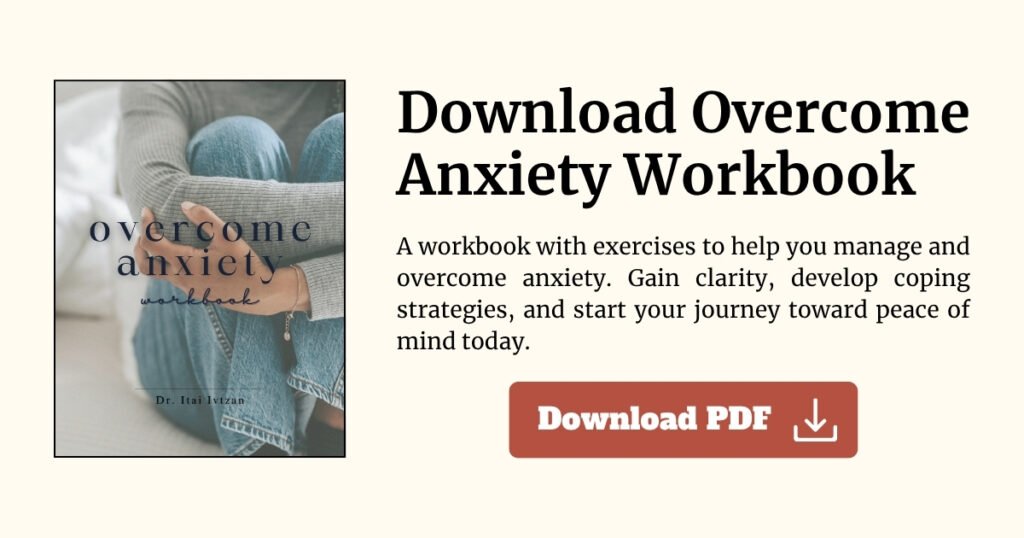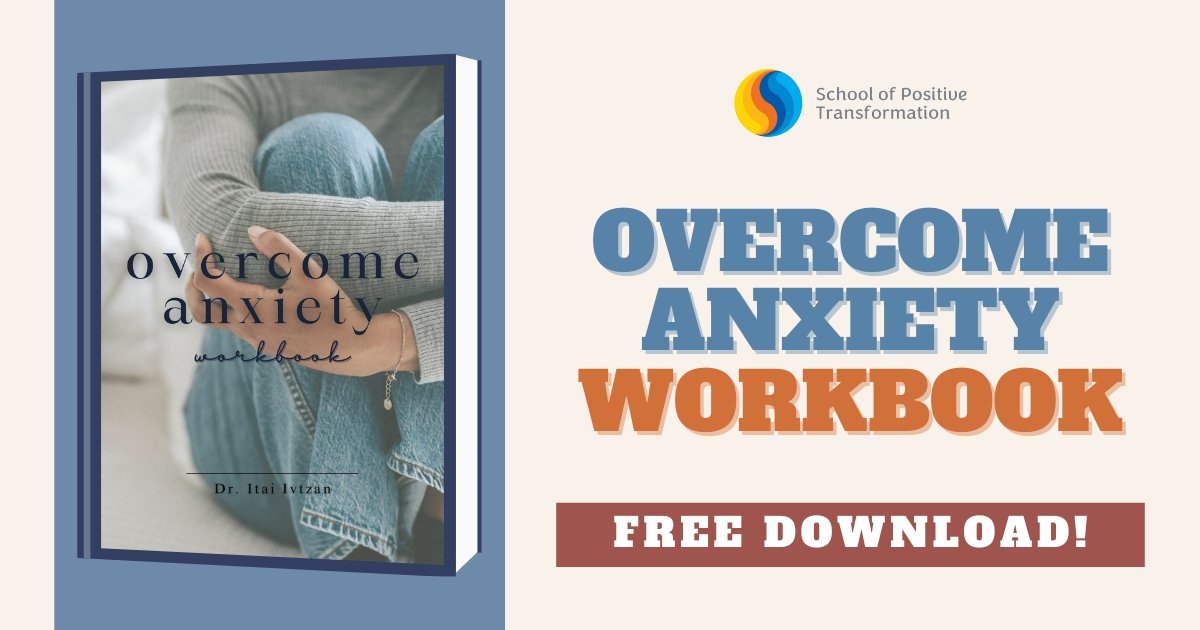This is Why Mindfulness Makes You Happier
Mindfulness makes you happier can help us focus our awareness and attention on the present moment, while calmly acknowledging and accepting our thoughts, feelings, and the sensations of our bodies, with a non-judgmental and curious attitude. It is often used as a therapeutic tool. We can learn this technique through meditation and mindfulness training as well as through the services of a meditation teacher or instructor. There are quite a few people out there qualified to help us learn. People who have received a meditation teaching certification through specialized meditation training.
Before you continue you might like to consider our free worksheet on exploring “Overcome Anxiety”. Please download this worksheet here.
It would seem obvious that mindfulness has its basis in ancient Buddhist ideas of acceptance and tolerance, so it should then come as no surprise that the modern practice of Mindfulness dates back to these earlier Buddhist teachings of about 2500 years ago. Modern mindfulness techniques though have been adapted to a more secular-leaning. Mindfulness or meditation techniques have been shown to have a positive effect on our mental attitude. Our minds translate the good and bad circumstances of our lives into happiness or misery. By concentrating on the positive aspects, and performing positive actions, such as expressing gratitude or contributing to charity, we enhance the effects of such positive thoughts. Think of adverse circumstances that cause unhappy feelings or bad thoughts as toxins, poisoning our minds. Positive thought, reinforced by positive action acts as antidotes, healing our soul. Mindfulnes training teaches us to live in the moment and examine it carefully. We live in the now, without the distractions of the past or concerns of the future. It enables us to fully focus. When mindfulness is practiced regularly, it can help us to live more calmly and function more effectively in our everyday life. No wonder it has become a welcome and beneficial addition to boardrooms, classrooms, hospitals, and locker rooms all over the world. Many people use the terms mindfulness and meditation interchangeably, but this is not truly the case. Traditional meditation techniques teach us to embrace an internal stillness, to strive to reach the ultimate concentration and consciousness, to disconnect from our surroundings. Mindful meditation training, on the other hand, teaches us to experience fully the world which exists around us. To taste, feel, see, hear, and smell what exists at the moment to the fullest extent. To use all our five senses and then move inward. Recognize how we are feeling, accept those feelings, and adjust them if necessary. Mindfulness wants us to live in the moment, not disconnect from the flow of time.
Mindfulness can make us calmer, more focused, and more effective, but can it truly make us happier? The answer appears to be in the affirmative. A recent study has shown that after eight weeks of one hour a day mindfulness training session, participants reported a significant increase in baseline happiness which lasted for four months. Mindfulness can bring about an increase in patience when dealing with people and situations. It helps us to establish and maintain connections and, probably due to a reduction in stress, can affect an improvement in our physical health. Everyone is aware, usually from personal experience, just how uncomfortable stress can be. Many are less aware though of its possible damaging effects. Stress can increase our heart rate as well as our blood pressure, both potentially dangerous conditions. It causes our pancreas to increase the production of glucagon while decreasing our supply of insulin, thus raising blood sugar levels. Increased amounts of adrenaline and cortisol flood our veins. Our immune system weakens and our blood platelets clot. And, rather inconveniently, we sweat more and feel the urge to use the bathroom more frequently.

We have just seen that stress can cause any number of problems. While stress itself may arise from what would be considered a positive circumstance, such as an upcoming wedding, or the birth of a new child, the emotion itself may be far from positive. William James, an American philosopher and psychologist of the 19th century stated that “The greatest weapon against stress is our ability to choose one thought over another.” That’s right. And mindfulness enhances our ability to step out of our downward spiraling thoughts and realign our focus. Once we feel ourselves being overcome with negativity, being sucked into that downward spiral, we can disengage and move on to a more positive aspect. Because mindfulness teaches us to fully experience everything in the moment, to be in touch with our feelings, we can identify a dangerous pattern quickly and take moves to correct it. We can stop ourselves from worrying too much about the future or dwelling on our past misfortunes. Mindfulness can make us the masters of our minds, not the slaves.
Mindfulness can improve and enhance our relationships with those around us. Human beings are social animals and have evolved over countless generations to be so. From the time we are very young, our brains require interactions with other humans to develop and function properly. This is so true that, recently, loneliness has come to be considered as a contributing factor to certain diseases, such as cardiovascular disease and Alzheimer’s. The old expression that no man is an island has proven to be true. Mindfulness helps us to deepen and enrich our relationships. When we live in the moment, experiencing all around us without distraction, we cannot help but interact more meaningfully with those we are in contact with. They will feel the attention we are giving them and feel connected in turn.
When we talk about happiness, we have to realize that there are two different forms that happiness can take. The first, hedonic, requires stimulation from the outside world. It can be fueled by money, success, approval of others, fame, or relations. Such happiness is transient and tends to vanish as soon as the outside factors diminish. The other kind called eudaimonic by the Greek philosopher Aristotle, is based on an inner sense of wellbeing, brought on by living under one’s own system of values. Mindfulness cultivates this inner sense of wellbeing. Allowing us to feel content within ourselves and needing no outside influences to contribute to this happiness. Ancient Chinese philosopher Lao Tzu, so well respected that he came to be considered a deity in certain Chinese traditional religions, expressed the basis of this type of happiness when he wrote,
“Be content with what you have;
rejoice in the way things are.
When you realize there is nothing lacking,
The whole world belongs to you.”
Mindfulness can enhance your gratitude. Often we are not grateful enough because we lose track of all the good things around us. Mindfulness tells us to slow down, to take a moment or two to take in all that is around us and within us. Stop and smell the roses, so to speak. Feel the refreshing air filling your lungs, giving you life, and be grateful for it. Literally, smell a rose and be grateful for its scent. Look at your kids, or even your pet, and feel your love returned, and be grateful for it. Eat a good meal, savoring every bite, and be grateful for it. Most of these are just small things, but too often we forget them and how they contribute to our life’s happiness. Wallow in them for a moment and feel grateful for the experience. It will help return your sense of wonder at all the things, both small and large, which make you happy. Be mindful of this happiness.
It seems only logical that practicing mindfulness can be a great benefit to virtually everyone. Mindfulness can make you happy, or happier. The techniques are easy to learn and easy to put into practice. Practicing mindfulness for simply an hour a day can make the other 23 passes much more pleasantly. Even if we are undisciplined, or are unable to commit to a regular schedule, there are simple techniques we can use to improve our outlook and emphasize the positive. Take a walk in the woods, experiencing the smell of the trees and earth, the song of the birds. Send imaginary hugs out to loved ones, losing yourself in their pleasure of their perceived presence. Walk along a beach collecting shells or sea glass, connecting with nature while enjoying the solitude. Or simply breathe. Try an exercise in “square breathing.” Inhale for a count of four, hold for 4, exhale for 4, and hold again for 4. Concentrate on every phase, and how it makes you feel. There is no downside to practicing mindfulness. Nobody ever felt worse by thinking about the moment and experiencing it to its fullest. Mindfulness fosters contentment and acceptance. It provides tools for improving our lives and ourselves and helps us to accentuate the positive and eliminate, or learn to deal with, the negative. What little effort you expend will be well worth it.
Ready to boost your happiness and well-being through mindfulness? Download our free ‘Overcome Anxiety Workbook’ and start practicing mindfulness to enhance your life today.





